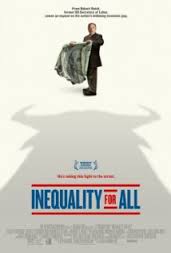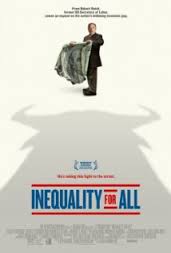Why are the rich getting richer while the poor keep falling further behind? Does it matter, and should we care? During your time at Harvard, questions like these have certainly come up. Maybe it was in class, at an event, or just chatting with friends.
For the most part, our answers are moral in nature. We feel inequality is wrong, unfair, or some other heartbreaking adjective. Having spent some time at our institution now, perhaps you are starting to feel that these arguments “break down under hard analysis,” as HKS Progressive Caucus member Jeff Kushner, MC/MPA ’14, recently put it. In that case, you find yourself at a bit of a crossroads. Should you give up arguing for economic equality, or find a new way to make the point?
If you’ve elected to find a new argument, then Robert Reich’s new film “Inequality for All” is for you. Mr. Reich is a professor at Berkley who was the US Secretary of Labor in the 1990s. In his new pursuit as documentary narrator, Mr. Reich looks at the growth of economic inequality in the United States since 1970, its increasing intensity, and the reasons behind it.
“The key element of the film is the fact that Reich makes an economic argument,” explained Kushner. “Reich’s argument is simple but robust: If you want to grow the economy and have a healthy democracy, America needs a healthy middle class and Americans must share the belief that anyone can get ahead.”
Last fall, Kushner had never heard of the film. He credits fellow mid-career Suzanne Amsler with bringing it to his attention. Kushner investigated.
“I brought the film to the HKS Progressive Caucus,” he explains. “’Inequality for All’ fit nicely with the Caucus’s alternative economics series.” The series, Kushner went on to explain, offers the HKS community new, sometimes provocative ways to think about economics.
In Kushner’s words, “Inequality for All” identifies “globalization, technology, the U.S. tax code as central to the inequality problem facing America. The former middle class has responded by women working in larger numbers, individuals working longer hours, and increased household borrowing, but none of this has prevented average Americans from falling behind their wealthier peers.The HKS Progressive Caucus put on a screening at the school which drew 100 attendees according to Kushner, and generated lots of conversation after the closing credits rolled. Kushner said that he hopes the buzz from the film will lead to a campus debate on inequality before the semester ends. The Citizen has received no word yet on any details.
If you missed the film screening at HKS, you can still catch “Inequality for All” by contacting the HKS Progressive Caucus (they have a loaner copy), watching the film on Netflix, or at other locations. You can find information about future screenings at the film’s website: http://inequalityforall.com/
Kushner is optimistic that as the film gains traction it will inspire new thinking about economic inequality. “Hopefully, I’ll see some of my classmates involved in this discussion in the days and years to come,” he said.

